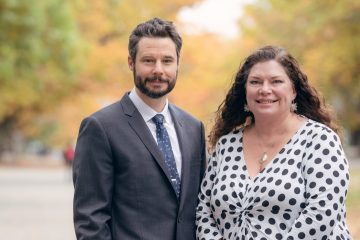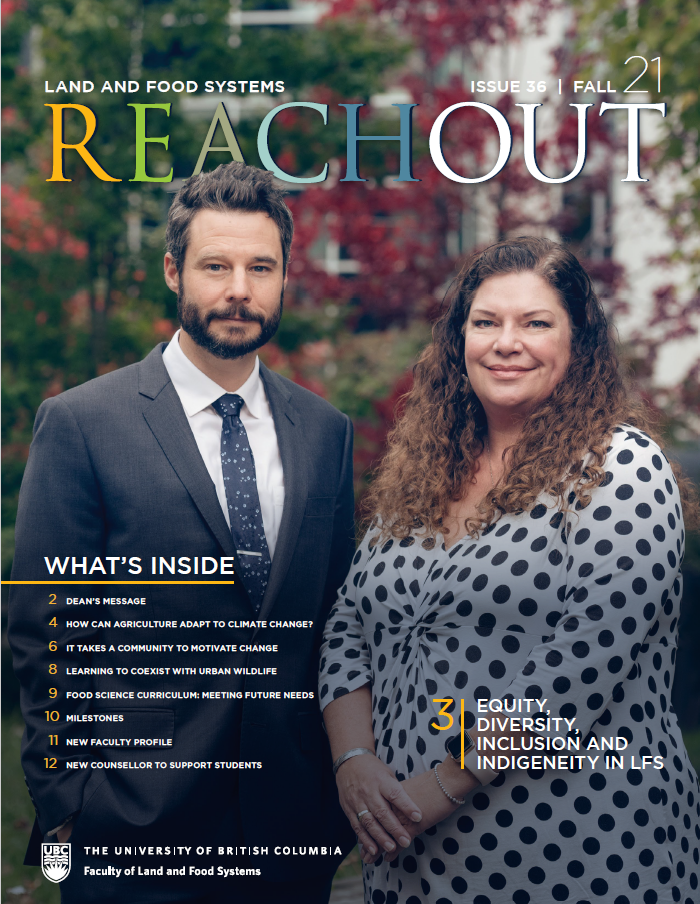Equity, Diversity, Inclusion and Indigeneity in LFS

(right) Dana-Lyn Mackenzie, Senior Manager of Equity, Diversity, Inclusion and Indigeneity
On September 30, LFS joined three other STEM (science, technology, engineering and math) faculties in an Intergenerational March for the National Day of Truth and Reconciliation. It was a solemn day of learning and introspection, as well as a visual demonstration of the faculty’s commitment towards equity, diversity, inclusion and Indigeneity (EDI.I).
At the helm of our journey are Dana-Lyn Mackenzie and Will Valley, working towards a more empathetic, inclusive, and just future.
Dana-Lyn Mackenzie is Senior Manager of Equity, Diversity, Inclusion and Indigeneity, cross-appointed in the faculties of Applied Science and Land and Food Systems. Mackenzie has worked to amplify Indigenous voices and EDI issues for more than eight years.
“During the pandemic, I had time to understand the importance of my community, First Nation, and family,” Mackenzie says.
She brings this sense of community to her work, where she advises on programming, admissions, student affairs, and much more. Her unique position in two faculties opens doors to joint programming, such as the Intergenerational March.
“There’s been a shift in the last few years,” says Will Valley, Associate Professor of Teaching and LFS’s Associate Dean of Equity, Diversity, and Inclusion. He teaches in the Land, Food and Community (LFC) core series, which integrates the wide array of disciplinary perspectives that fall under food systems education.
Valley explains that in Canada, our dominant food systems are built on a history of racial inequity and settler colonial violence. Yet often, issues of social justice, power, and oppression are absent or under-emphasized in food-related curriculum and pedagogy. However, in 2016 he attended a conference that explicitly and systematically critiqued the “unbearable whiteness” of sustainable agriculture and alternative food systems. This conference jolted him into re-evaluating how he instructed.
Around the same time, Valley received feedback from community partners who worked with students from the LFC series courses. They had concerns that LFS students needed more awareness and preparation around social issues, such as how class, ability, gender, race, and colonialism intersect with food security.
Valley explored how to better support student capacity to engage with these difficult topics through conferences, workshops, and scholarly literature. However, it has been through open collaboration with Mackenzie, and those in other faculties at UBC that allowed Valley to further his understanding of EDI.
Often, dissecting the systems in our society is a painful process. If you benefit from an oppressive system, you must struggle with the cognitive dissonance that what is benefiting you is often at the expense of others. If you are harmed by the system, you must face the harm directly and inspect how it has impacted your life.
“We have to develop the stamina to sit with the discomfort,” Valley instructs. “It starts with having a better understanding of oneself and how we react to open discussions of issues that are typically avoided in STEM classrooms, and then we begin to see how deeply these systems run.”
He likens the learning to using a tool for the first time. In STEM disciplines, students and graduates have likely not had the opportunity to use these tools, since intellectual development takes priority over critical-reflection, affect, and emotion. He says just like using a shovel for the first time, “blisters” are inevitable, but continuous effort builds up callouses that allow students and graduates to develop the stamina to re-examine and re-structure the systems around them.
“Pushback is inevitable, and thoughtful change takes time,” Mackenzie stresses. “That’s why the learning students do now will carry on once they graduate.”
Student Insight: Anisha Sandhu (FNH major)

What do you think of the opportunities to further EDI.I in the faculty?
“Students need to have more opportunities to interact with food system complexities through an equity, diversity, and inclusion lens. I’m very fortunate to have been and be in the positions I’m in. However, that required some digging and extra work outside the responsibilities of my roles. I hope our faculty can work towards integrating more discussions in courses around EDI and how it shows up in the course content. That being said, there is also a need to support faculty members on how to do this. There is a desire from students, staff, and faculty to engage more in EDI learning and initiatives. However, capacity issues create several speed bumps.”
Tagged with: 2021, Equity Diversity Inclusion and Indigeneity, Indigenous
